Intel Xeon E-2136 Benchmarks
For this exercise, we are using our legacy Linux-Bench scripts which help us see cross-platform “least common denominator” results we have been using for years as well as several results from our updated Linux-Bench2 scripts. At this point, our benchmarking sessions take days to run and we are generating well over a thousand data points. We are also running workloads for software companies that want to see how their software works on the latest hardware. As a result, this is a small sample of the data we are collecting and can share publicly. Our position is always that we are happy to provide some free data but we also have services to let companies run their own workloads in our lab, such as with our DemoEval service. What we do provide is an extremely controlled environment where we know every step is exactly the same and each run is done in a real-world data center, not a test bench.
We are going to show off a few results, and highlight a number of interesting data points in this article.
Python Linux 4.4.2 Kernel Compile Benchmark
This is one of the most requested benchmarks for STH over the past few years. The task was simple, we have a standard configuration file, the Linux 4.4.2 kernel from kernel.org, and make the standard auto-generated configuration utilizing every thread in the system. We are expressing results in terms of compiles per hour to make the results easier to read:
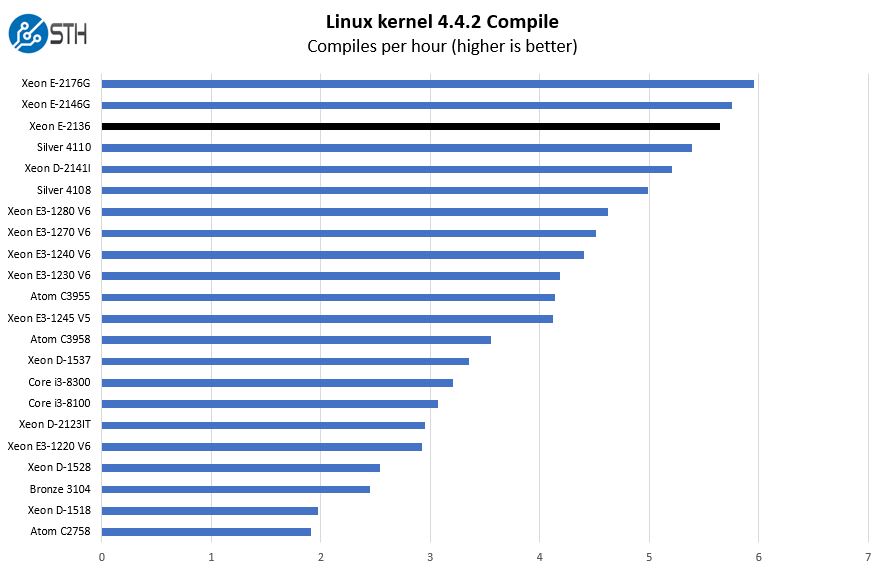
The Intel Xeon E-2136 is an exceptionally strong performer. As we are going to see, it is only slightly slower than the higher-binned parts from the same family, yet it is significantly less expensive.
c-ray 1.1 Performance
We have been using c-ray for our performance testing for years now. It is a ray tracing benchmark that is extremely popular to show differences in processors under multi-threaded workloads. We are going to use our 8K results which work well at this end of the performance spectrum.
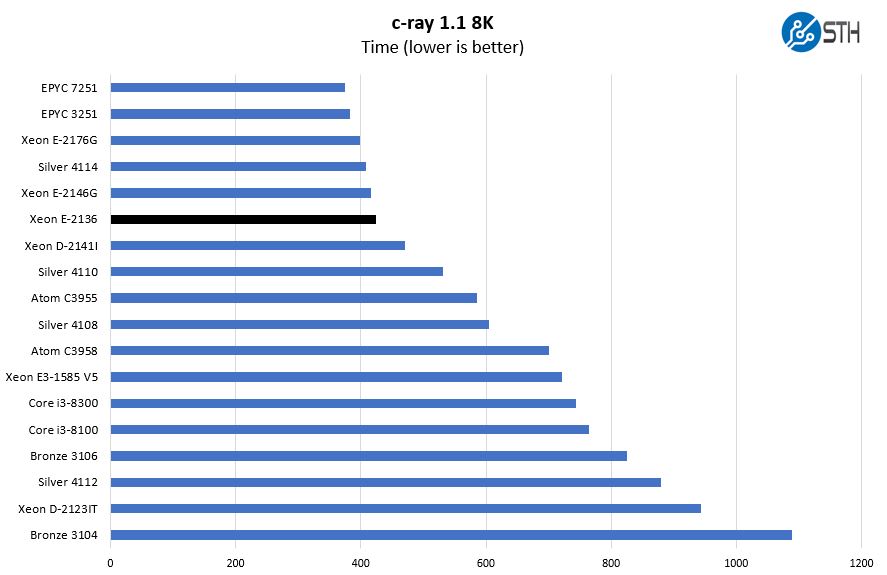
We wanted to add some context around these numbers. For example, the six-core Intel Xeon E-2136 has awesome clock speeds. As a result, it is able to keep up, or best, 8-core Intel Xeon Silver and Intel Xeon D-2100 series models in many workloads. Clock speed is still very important.
7-zip Compression Performance
7-zip is a widely used compression/ decompression program that works cross-platform. We started using the program during our early days with Windows testing. It is now part of Linux-Bench.
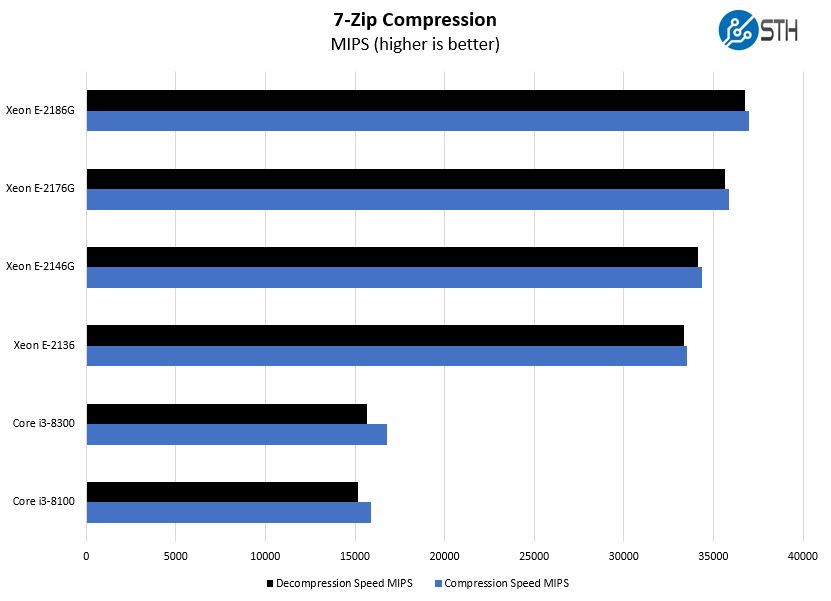
We wanted to take a double-click look at compression performance. The chips in this comparison range from the lower-end (for the socket) Intel Core i3-8100 to the high-end Intel Xeon E-2186G. There is certainly a big delta between the lower-end parts and the 6 core models, but the gap between the 6 core models is slim. You get a bigger benefit moving from the four core CPUs to the Intel Xeon E-2136 than from the Intel Xeon E-2136 to the Intel Xeon E-2146G.
NAMD Performance
NAMD is a molecular modeling benchmark developed by the Theoretical and Computational Biophysics Group in the Beckman Institute for Advanced Science and Technology at the University of Illinois at Urbana-Champaign. More information on the benchmark can be found here. We are going to augment this with GROMACS in the next-generation Linux-Bench in the near future. With GROMACS we have been working hard to support Intel’s Skylake AVX-512 and AVX2 supporting AMD Zen architecture. Here are the comparison results for the legacy data set:
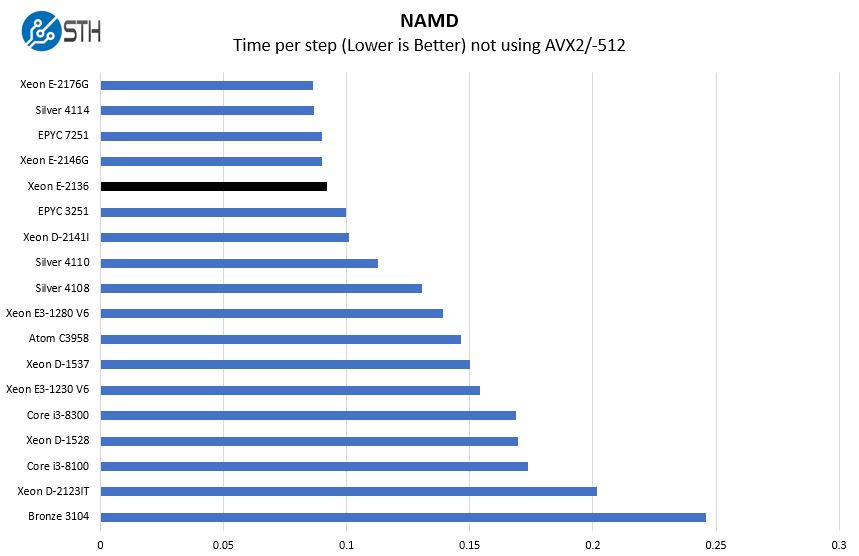
High clock speed helps here again putting it into the realm of 8 core processors with lower clock speeds.
Sysbench CPU test
Sysbench is another one of those widely used Linux benchmarks. We specifically are using the CPU test, not the OLTP test that we use for some storage testing.
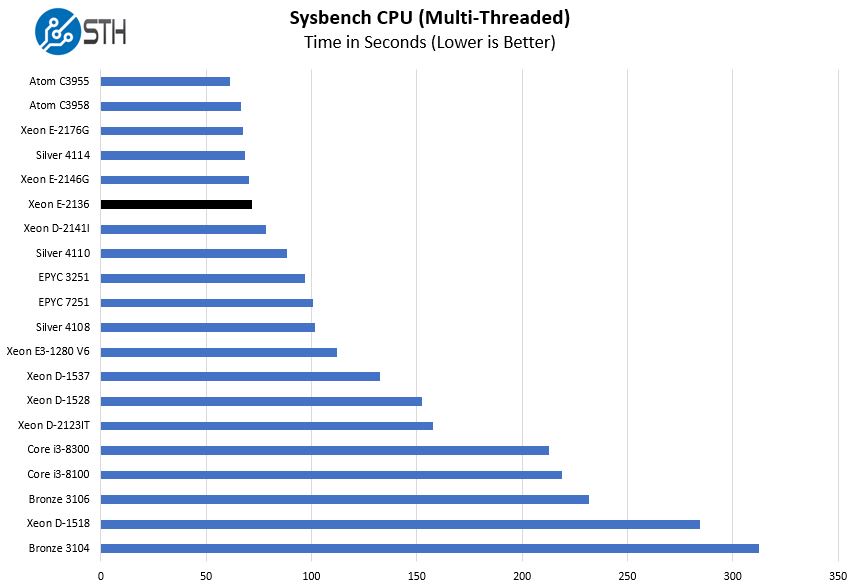
Some of the embedded CPUs in the same price range are simply not as fast. They trade clock speed for cores or low power consumption, but for speed, the Xeon E-2136 is a very quick even nearing 16 core Intel Atom C3000 parts.
OpenSSL Performance
OpenSSL is widely used to secure communications between servers. This is an important protocol in many server stacks. We first look at our sign tests:
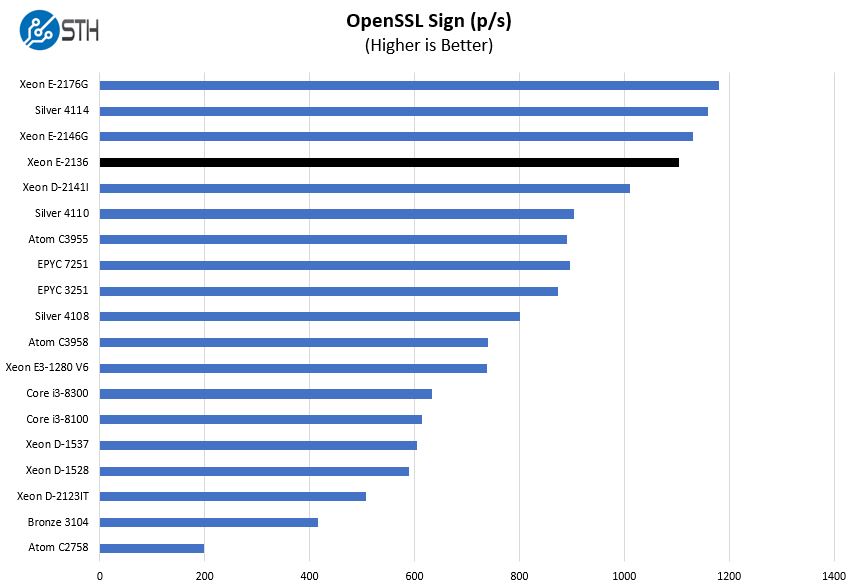
Here are the verify results:
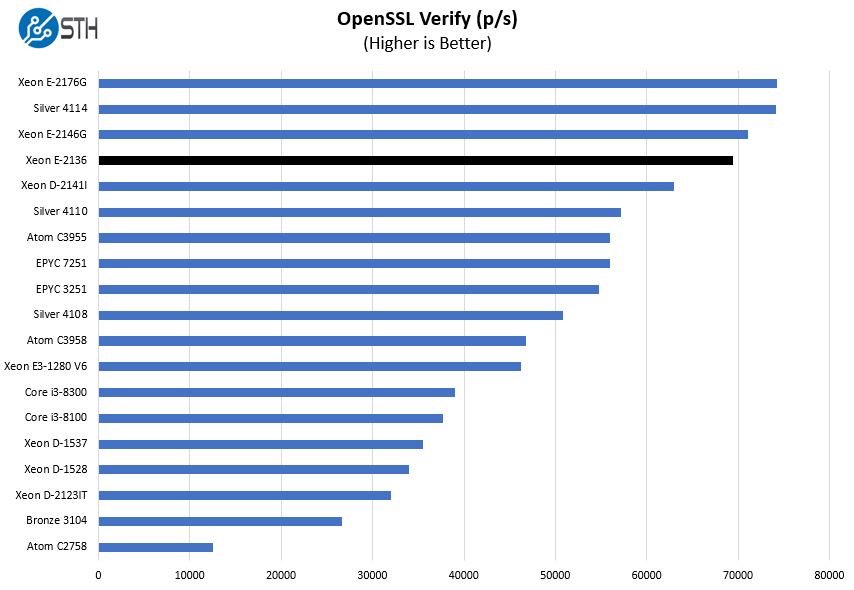
High clock speeds and a newer microarchitecture help again with OpenSSL. As a foundational element to many of today’s applications, this is an important test.
UnixBench Dhrystone 2 and Whetstone Benchmarks
Some of the longest-running tests at STH are the venerable UnixBench 5.1.3 Dhrystone 2 and Whetstone results. They are certainly aging, however, we constantly get requests for them, and many angry notes when we leave them out. UnixBench is widely used so we are including it in this data set. Here are the Dhrystone 2 results:
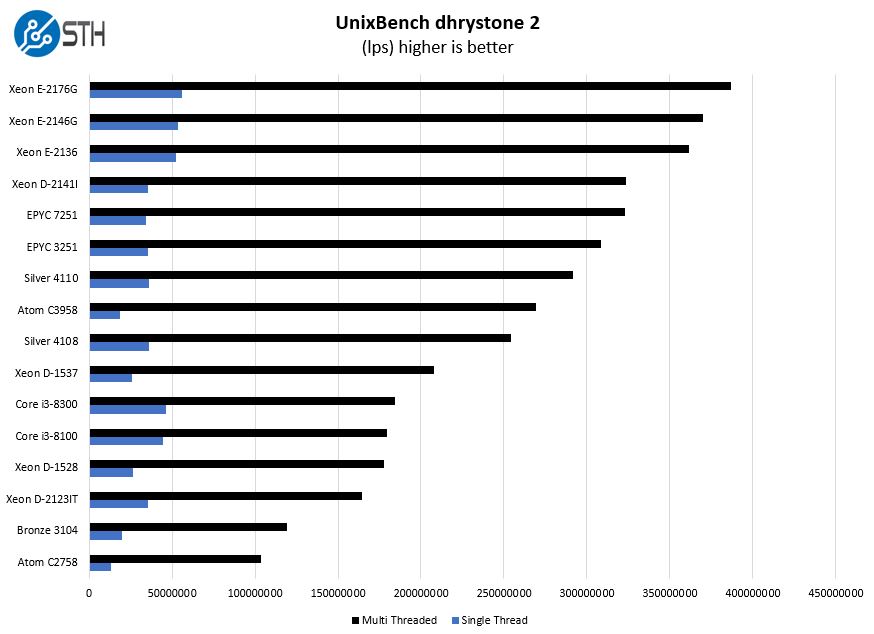
Here are the whetstone results:
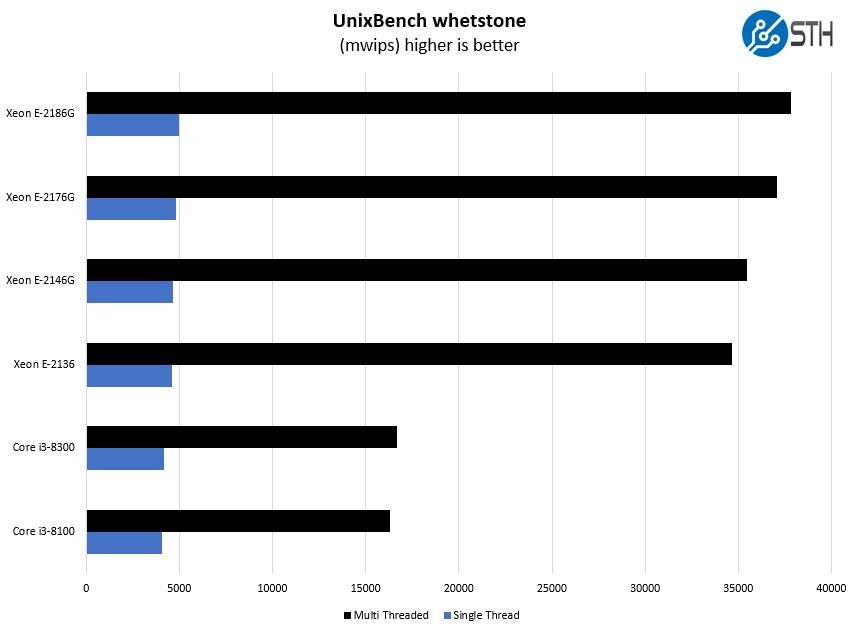
For the dhrystone results, we are showing the full data set. For the UnixBench whetstone 2 results, we are focusing on the in-socket alternatives. We wanted to show a bit more detail around single threaded performance. The extra turbo boost helps notch a win over the Intel Core i3 parts despite lower base clocks.
GROMACS STH Small AVX2/ AVX-512 Enabled
We have a small GROMACS molecule simulation we previewed in the first AMD EPYC 7601 Linux benchmarks piece. In Linux-Bench2 we are using a “small” test for single and dual socket capable machines. Our medium test is more appropriate for higher-end dual and quad socket machines. Our GROMACS test will use the AVX-512 and AVX2 extensions if available.
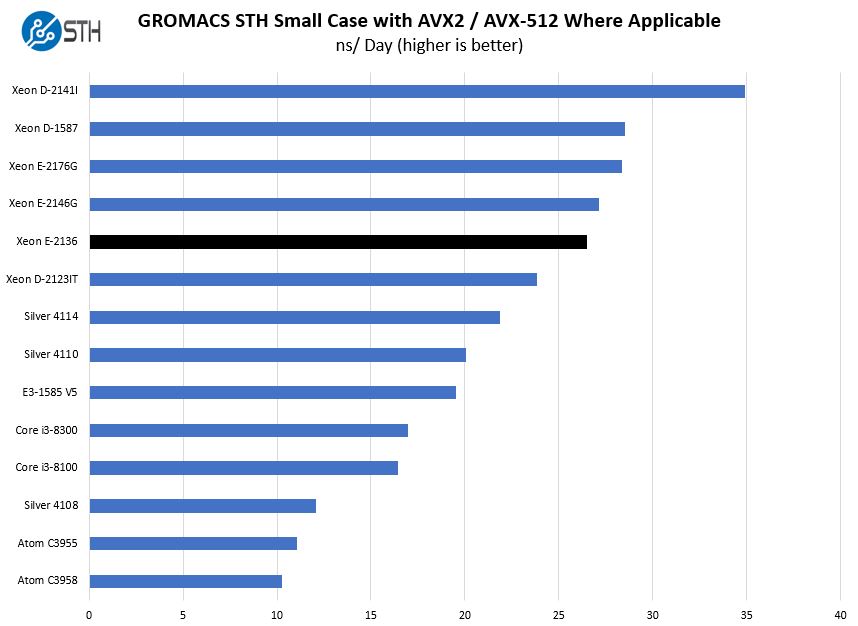
High clock speeds help, but as one can see, dual port AVX-512 is in another league. If you need AVX-512 performance, Intel Xeon Gold 6100 series is where you should look.
Chess Benchmarking
Chess is an interesting use case since it has almost unlimited complexity. Over the years, we have received a number of requests to bring back chess benchmarking. We have been profiling systems and are ready to start sharing results:
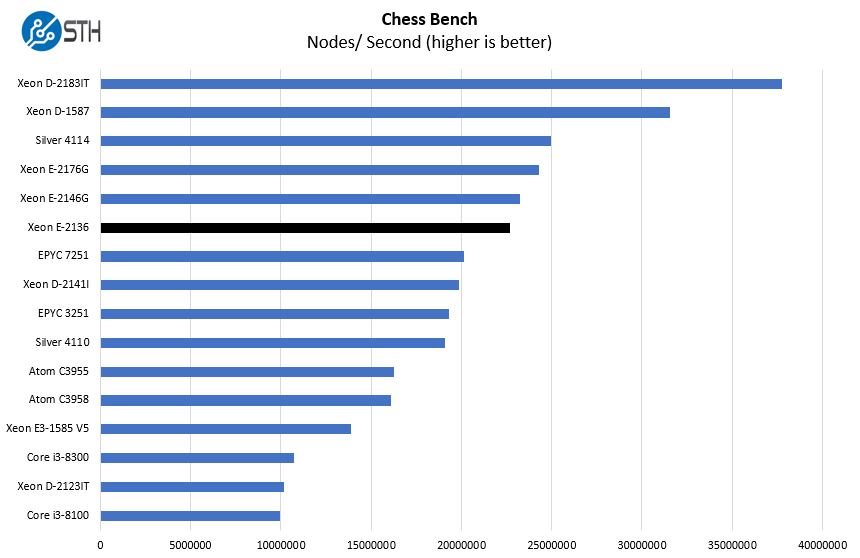
Again we see a strong performance here. We know many of our readers are eagerly awaiting the AMD EPYC 3001 series release. Here the Intel Xeon E-2136 edges out the AMD EPYC 3251 despite the AMD chip having more cores. AMD uses less power, has 10GbE built-in, and more PCIe lanes but you can easily get the Intel Xeon E-2136 today.
Next, we are going to have the power consumption, market positioning, and our final words.




but does it run crysis ?
Are these performance results from a system that’s been hardened to Spectre/Meltdown, etc?
Is the idle power consumption the total system idle power consumption with the mentioned config (Motherboard, CPU, RAM, SSD and SATADOM drive)?
Appears the 33W idle/102W loaded is for the entire system. The author mentions an entire system can be powered within 1A on a 120V circuit with the stated numbers taken off a 208V PDU port.
We actually test both 208V and 120V now since we have data centers close by with each. 208V for comparison to other rackmount servers. We usually use 120V for embedded comparisons and some of the lower-end tower servers. Power consumption is higher for 120V, but it will still fit in 1A colo.
For ****’s sake, why didn’t you test these Coffee Xeons in gaming, at least some benchmarks…
There’s absolutely no info at the moment on their gaming performance…
Hi Valera, we are the server site, not the gaming site. Assume that these chips perform like a Core i7 counterpart that is sticking to spec’d power levels. That model gets you within 1-2% of actual performance.
Honestly I dont’t unterstand why the MB supports this Xeon, actually it should only support 1151 Socket – the for example the Xeon E2146 is Socket 1151 v2 – Do I have to update the bios to get it working or means 1151v2 the same as 1151? I really would like to get this Board, or maybe the X11SCH-LN4F with an Xeon E2146 – does this work?